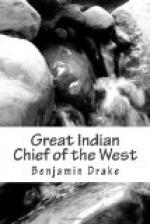The whites who established themselves at this place, in violation of the laws of congress, and the provisions of the treaty of 1804, committed various aggressions upon the Indians, such as destroying their corn, killing their domestic animals, and whipping the women and children. They carried with them, as articles of traffic, whiskey and other intoxicating liquors, and by distributing them in the tribe, made drunkenness and scenes of debauchery common. Black Hawk and the other chiefs of the band, remonstrated against these encroachments, and especially in regard to the introduction of spirituous liquors among their people: and, upon one occasion, when a white man continued, openly, to sell whiskey to them, the old chief, taking with him one or two companions, went to his house, rolled out the barrel of whiskey, broke in the head, and emptied its contents upon the ground, in presence of the owner. This was done, as he alleges, from the fear that some of the white persons would be killed by his people when in a state of intoxication. Thus things wore on until 1827. During that winter, while the Indians were making their periodical hunt, some of the whites, in the hope of expediting their removal to the west side of the Mississippi, set on fire, in one day, about forty of their lodges, a number of which were entirely consumed. When the Indians returned in the spring and demanded satisfaction for the destruction of their property, they were met by new insults and outrages.
In the summer of 1829, Black Hawk happened to meet, at Rock island, with the late governor Coles, of whom he had heard as a great chief of Illinois, in company with “another chief” as he calls him—Judge Hall. Having failed in his appeals to the Indian agents, for redress of the grievances of his people, he determined to apply to these two chiefs, on the subject, and accordingly waited upon them for that purpose.




